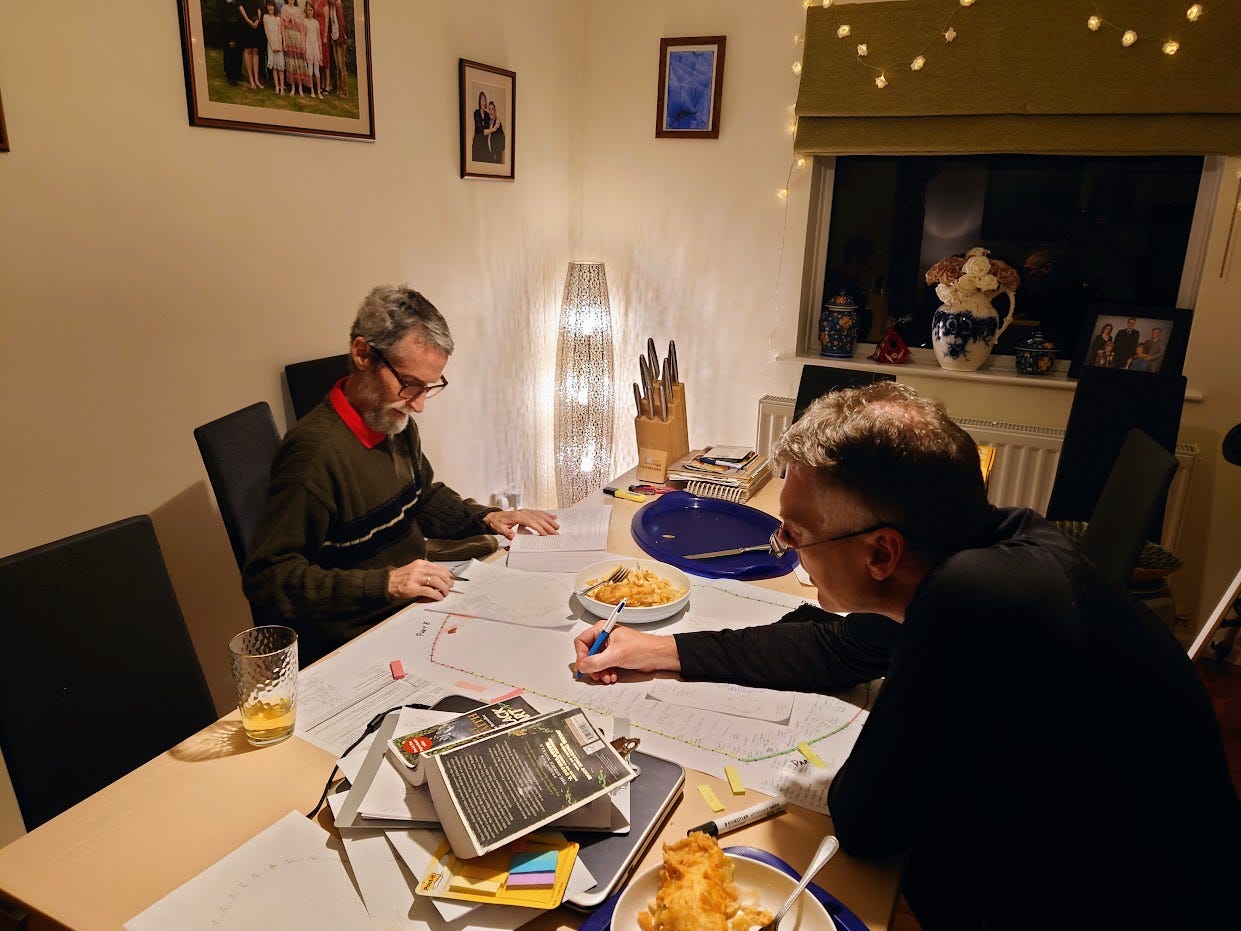Running Grave, Part Zero: A Ring Reading
The Prologue as a Ring Structure
Being far more of a paragon of patience, our Headmaster Dr John Granger has been delaying his gratification of completing The Running Grave by charting each part of the book into (hopefully) a classical ring structure complete with latch, turn and turtleback. Currently you can see his results of Part 1 here and Part 2 here.
I was very privileged to be given an almost complete day tutorial on ring structure with John when he visited Wales this Summer using The Ink Black Heart as a text. This was a remarkable act of generosity when you consider he was only in the country for a few days, and one was already reserved for accepting his doctorate from Swansea University.
In a Skype call last weekend we were discussing John’s progress in charting Part 1, and I was trying my very best not to give any indication of the plot or structure past this, having completed my first reading that morning. Conversation moved to the Prologue, which as it both starts and finishes with letters from the Edensor parents also likely was chiastic in structure.
I had bought a physical copy of the book (Sarah, my wife, prefers this, and she wanted to see if Aylmerton shared similarities to a community she spent some time with as a child - it didn’t, thank goodness) so in less than forty minutes we sketched out a fair (if not perfect) ring structure.
Helpfully each of the sections were labelled in the Prologue which helped identify the turn axis of legal correspondence (and major data dump) to Sir Colin Edensor and Kevin Pirbright. John has noted that the meaning here seems to be that the law is helpless in aiding the injured but can be easily weaponized to serve the powerful. In this case, even the rich and connected Sir Colin and his lawyer, have to defer to the UHC’s lawyers unless they or Kevin can find some corroborating evidence.
The section is bracketed with the letters from Sir Colin and his wife to Will, forming the latch, with the turn reflection being the very data rich letter from UHC’s lawyers to Kevin Pirbright, coming directly after the first batch of family letters.
The first line of turtlebacks are formed by Kevin’s letter to Sir Colin and then Sir Colin’s letter to Kevin. Kevin, who’s death is revealed in chapter 4, and his agony tortured memories make clear warning for what Will might become if not rescued from the cult before too long.
The next turtleback line is formed from the wonderfully tilted Zeitgeist and ClickLit magazines from the UHC’s pet celebrities Noli Seymour and Giles Harmon, contrasting strongly the star’s shallowness and egocentricity with Kevin’s squalid but genuine pain.
Other than the turn reflection letter from Coolidge and Fairfax, this is a clear ring structure with two turtlebacks. The latch of the family letters are needed to focus the section on the need of the family for the Strike-Ellacott Detective Agency, and the turn and turn reflection are needed just for the sheer amount of exposition that can be dropped without the need for dialogue.




The idea of the law being on the side of the rich and powerful and the weak and poor needing heroic champions reminds me of the steong Robin Hood connections in this book. Robin the outlaw archer fighting for the downtrodden against the lawful oppression of the Sheriff of Nottingham.
Nick, what fun that must have been to get your own tutorial with John! And how astute of him to suggest the meaning is "the law is helpless in aiding the injured but can be easily weaponized to serve the powerful." I'd like to suggest another theme, one that I didn't notice until I'd read the epilogue, that of happiness (or unhappiness). Sally asks for reassurance that Will is happy, and though he insists he is, the subject of happiness is repeated. Sir Colin writes to Kevin "extremely unhappy" about Kevin's public behavior. The epilogue opens with a very happy scene: Qing, re-christened Sally, chasing bubbles (and surrounded by BPs lol). Later Lucy beams at Strike saying,"... as long as you're happy" and "what you said about Leda... you've really helped me." But Strike has a heavy heart on the way to see Amelia, who says of Charlotte "she was always so... unhappy." And Strike replies,"it's dangerous to make a cult of your own unhappiness. It's hard to get out..." and he shares with her a quote from Aeschylus he once quoted to Charlotte,"happiness is a choice that requires effort at times." Later when Robin notices how depressed Strike is he talked about giving Amelia the reassurance that nobody could've stopped Charlotte except him. And he knew what her last words to him would be, that he'd never be happy without her and that "she knew I was in love with you." After a confused and shocked Robin leaves with Ryan, Strike left himself, his last thought was how happiness is a choice requiring an effort at times, and "it was well past time to make an effort."
How many days to the next book?? I'm also going to be making an effort to choose happiness till then.